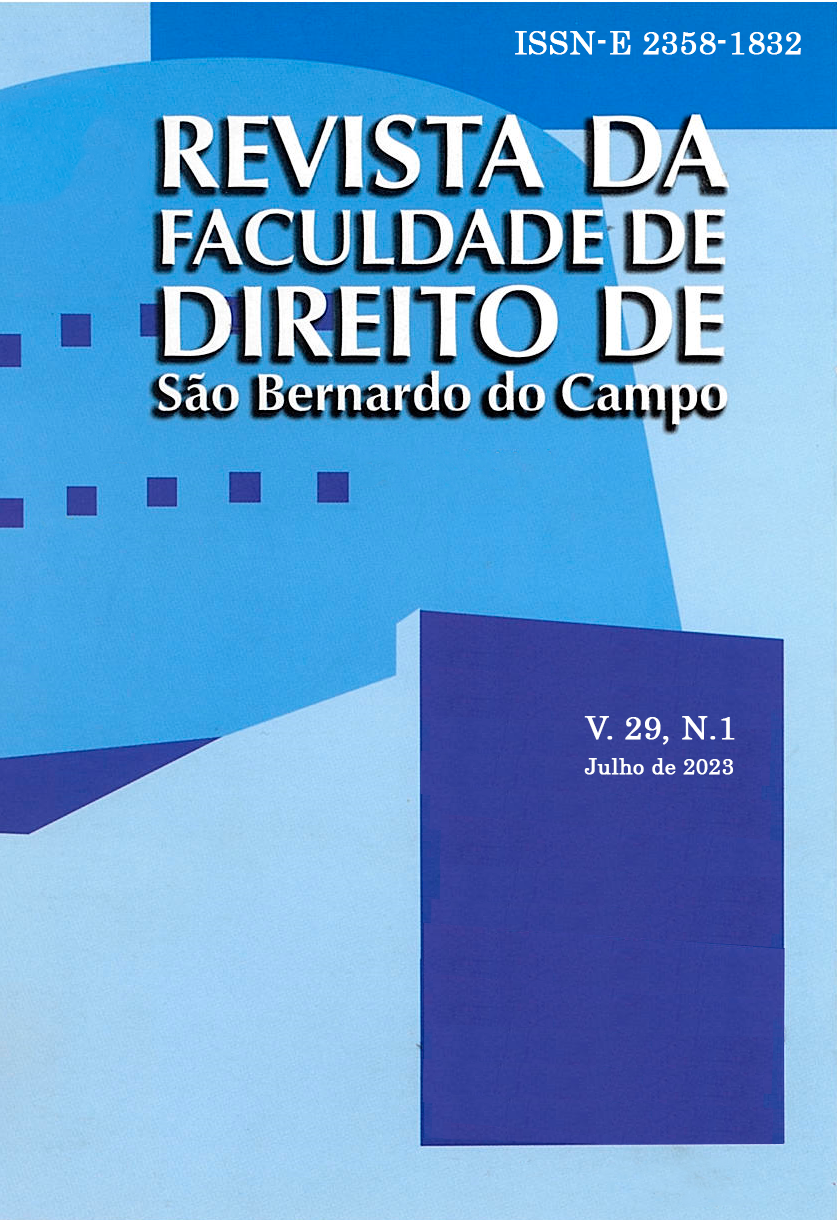A DISTÓPICA ELEIÇÃO DE JAIR BOLSONARO
Palavras-chave:
Jair Bolsonaro, Eleição presidencial de 2018, Ditadura, Democracia, Polaridade política PT x PSDB, CorrupçãoResumo
O presente artigo visa demonstrar de que forma um candidato de extrema-direita, defensor de pautas contrárias a basilares princípios constitucionais, como a prática da tortura, a discriminação e o ataque a minorias menos favorecidas ao longo da história brasileira, pôde ser eleito com apoio de importante parcela da população do Brasil. Pretende-se debater como tal fato concretizou-se, a despeito dos avanços civilizatórios na defesa dos direitos fundamentais desde 1988 em um país, cujos habitantes haviam dado provas de que não tolerariam mais discursos dessa envergadura, mas que acabaram por avalizar retrocessos equiparáveis, apenas, aos vistos durante a ditadura militar iniciada em 1964. Para entender o contexto, será feita uma retrospectiva histórica, partindo-se do regime militar, passando-se pela redemocratização e todos os governos que a sucederam, com especial atenção à transição entre o governo de Dilma Rousseff (principalmente, o seu impeachment) e de Michel Temer, em que propiciou o retorno dos grupos de extrema-direita alijados do poder em 2002, mas que viram em Jair Bolsonaro o único capaz de fazer frente ao PT.
Referências
ALMEIDA, Ronaldo. Bolsonaro Presidente: conservadorismo, evangelismo e a crise brasileira. In: Novos estudos CEBRAP, São Paulo, v 38, n.1, 2019. Disponível em:<https://www.scielo.br/pdf/nec/v38n1/1980-5403-nec-38-01-185.pdf>. Acesso em 27 maio 2020.
ANDERSON, Perry. The dark side of brazilian conviviality. In: London Review of Books, v. 16, n. 22-24, 24 nov. 1994. Disponível em: <https://www.lrb.co.uk/the-paper/v16/n22/perry-anderson/the-dark-side-of-brazilian-conviviality>. Acesso em 25 maio 2020.
______. The Cardoso legacy. In: London Review of Books, v. 24, n. 24, 12 dez. 2002. Disponível em: <https://www.lrb.co.uk/the-paper/v24/n24/perry-anderson/the-cardoso-legacy>. Acesso em 26 maio 2020.
______. Lula’s Brazil. In: London Review of Books, v. 33, n. 7, 31 mar, 2011. Disponível em: <https://www.lrb.co.uk/the-paper/v33/n07/perry-anderson/lula-s-brazil>. Acesso em 26 maio 2020.
______. Crisis in Brazil. In: London Review Books, v. 38, n. 08, 21 abr 2016. Disponível em:<https://www.lrb.co.uk/the-paper/v38/n08/perry-anderson/crisis-in-brazil>. Acesso em 29 maio 2020.
______. Bolsonaro’s Brazil. In: London Review Books, v. 41, n. 3, 07 fev. 2019. Disponível em: <https://www.lrb.co.uk/the-paper/v41/n03/perry-anderson/bolsonaro-s-brazil>. Acesso em 29 maio 2020.
ANDRADE, Antônia Costa. Os governos FHC e Lula e a ressignificação do neodesenvolvimentismo: o reuni. Tese de Doutorado. Uberlândia, UNIVERSIDADE FEDERAL DE UBERLÂNDIA, 2013.
CURADO, Marcelo. Uma avaliação da economia brasileira no Governo Lula. In: Revista Economia & Tecnologia, Paraná, v. 07, n. especial, 2011. Disponível em: <https://revistas.ufpr.br/ret/article/view/26881/17837>. Acesso em: 26 maio 2020.
FIGUEIREDO Rubens; COUTINHO, Ciro. A eleição de 2002. In: Opinião pública, Campinas, v. 09, n. 02, out. 2003. Disponível em: <https://www.scielo.br/pdf/op/v9n2/v9n2a05.pdf>. Acesso em 26 maio 2020.
GORENDER, Jacob. Hegemonia Burguesa: reforçada pela prova eleitoral de 94. In: Revista Crítica Marxista. São Paulo, 1995.
KAYSEL, André. Regressando ao Regresso: elementos para uma genealogia das direitas brasileiras. In: Velasco e Cruz, Sebastião; KAYSEL, André; CODAS, Gustavo (org.). Direita, volver! O retorno da direita e o ciclo político brasileiro. São Paulo: Editora Fundação Perseu Abramo, 2015.
OLIVEIRA, Tiago Bernardon de. O golpe de 2016: breve ensaio de história imediata sobre democracia e autoritarismo. In: Historiae. Rio grande do Sul, v. 07, 2016.
SALLUM JÚNIOR, Basílio; PAIXÃO E CASARÕES, Guilherme Stolle. O impeachment do Presidente Collor: A literatura e o Processo. In: Lua Nova, v. 82, 2011.
SILVA, I. G. A agenda conservadora assume o centro da cena política no Brasil. In: Lutas Sociais, v. 20, n. 36, jan./jun. 2016.
SOUZA, Jessé. A radiografia do golpe. São Paulo: LeYa, 2016.
SOUZA, Josias. Lula tornou-se candidato ao posto de assombração do próximo presidente. In: Blog do Josias. 2 set. 2018. Disponível em <https://josiasdesouza.blogosfera.uol.com.br/2018/09/02/lula-virou-candidato-ao-posto-de-assombracao/>. Acesso em 27 maio 2020
VALIM, Rafael. Estado de exceção: a forma jurídica do neoliberalismo. São Paulo: Contracorrente, 2017.
VELASCO E CRUZ, Sebastião. Elementos de reflexão sobre o tema da direita (e esquerda) a partir do Brasil no momento atual. In: Velasco e Cruz, Sebastião; KAYSEL, André; CODAS, Gustavo (org.). Direita, volver! O retorno da direita e o ciclo político brasileiro. São Paulo: Editora Fundação Perseu Abramo, 2015.
Downloads
Publicado
Como Citar
Edição
Seção
Licença
TERMO DE CESSÃO DE DIREITOS AUTORAIS
Pelo presente instrumento jurídico particular, na condição legal de autor(a) e detentor(a) dos direitos autorais sobre a obra ora apresentada para avaliação, transfiro integralmente, pelo presente Termo de Cessão de Direitos Autorais, à Faculdade de Direito de São Bernardo do Campo – Autarquia Municipal, sediada na Rua Java, 425, Jardim do Mar, São Bernardo do Campo, SP, CEP 09050-450, inscrita no Cadastro Nacional de Pessoa Jurídica sob o número 59.108.100/0001-89, os direitos de edição, publicação, ditribuição, reprodução em qualquer formato (impresso, digital ou qualquer outra plataforma) e forma de comercialização, bem como todos os elementos que possam conter, patrimoniais ou não, referentes à esta obra, com fundamento nos artigos 28 a 33 da Lei Federal nº 9.610, de 19 de fevereiro de 1998 (Lei de Direitos Autorais), para a finalidade específica de publicação na Revista da Faculdade de Direito de São Bernardo do Campo e Repositório Eletrônico, podendo ser o artigo livremente consultado e reproduzido.
Fico ciente, ainda, que tal transferência se dá por prazo de forma definitiva e irretratável.
Estou ciente de que o envio da obra implica na concordância total com o acima exposto.





